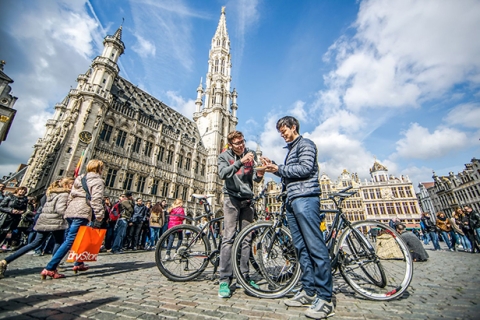Meet Sustainably in Brussels

As the desire for sustainable meetings and events grows, so does the need for sustainable cities in which to hold them. The city of Brussels, Belgium was ranked ninth in the 2009 European Green City Index and now, a decade later, the city is well on its way towards its goal of becoming the “Green city of Europe” by 2024.
“As Europe’s leading terminal for international high-speed trains, Brussels is becoming a greener place to meet,” said Elisabeth Van Ingelgem, director of the Convention & Association Bureau at visit.brussels.
She continued, “The city was voted the number one sustainable city in Europe in terms of environmental policy in the European Green City Index and holds the number 10 spot in the Global Destination Sustainability (GDS)-Index. It is one of the greenest cities in Europe with 28 square meters of green space per inhabitant and is one of the most active cities in the area of passive construction with more than 265,000 square meters of exemplary buildings.”
The first step toward holding a sustainable meeting is finding a sustainability-friendly venue. Choosing a destination that is easily accessible via public transportation helps cut down on carbon emissions. If your event is too large to host in a hotel, offer sleeping room accommodations as close to your venue as is possible.
Visit.brussels recommends selecting properties that have shown care about sustainable development (eco-friendly accommodation) and pursue a policy of corporate social responsibility (CSR), or have been awarded an eco-label such as the Green Key.
The Green Key program, an initiative of the Foundation for Environmental Education (FEE), aims to promote sustainable development in tourism infrastructure. The bureau provides a list of hotels, venues and other accommodations within Brussels that have been awarded this designation, and for larger meetings, a list of sustainable venues.
Minimizing waste is another important element of sustainable meetings. But for planners and venues to be able to do this most effectively, the infrastructure for recycling and waste management needs to be in place – which often requires a city-wide initiative.
“Brussels is a leader in waste management and number one in Europe in the recycling of packaging waste,” von Ingelgem said. “There is a strong political will to make Brussels a pioneering city in sustainable and responsible tourism.”
She continued, “The Brussels-Capital Region focuses strongly on the circular economy (PREC program), good food and the fight against waste (Good Food Brussels). Last but not least, the most polluting vehicles have been progressively banned since 2018 from the Brussels-Capital Region as part of the Low Emission Zone (LEZ) strategy.”
Brussels is in the process of developing a regional sustainable development plan that will include a sustainable city district, sustainable neighborhoods and a mobility center promoting sustainable mobility.
Visit.brussels offers a helpful guide for event planners who wish to hold more sustainable meetings. The guide, developed by the MPI Belgium Chapter and funded by the Brussels Institute for Environmental Management (Bruxelles Environnement) as part of the Meetings Go Green project, provides event managers with tools, best practices and courses of action to help them organize eco-friendly, low-waste activities.
Download your complimentary copy of the Meetings Go Green guide HERE.
Don’t miss any event news! Sign up for any (or all) of our e-newsletters HERE & engage with us on Twitter, Facebook, LinkedIn & Instagram!


Add new comment